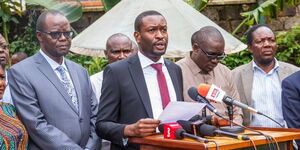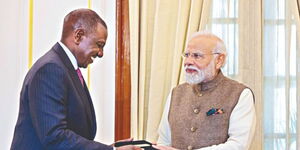Attorney General Dorcas Oduor has urged Kenyans to formally register their marriages, calling on couples married through customary traditions to obtain official certificates.
Speaking during a government outreach program at Kibigori Secondary School in Muhoroni Sub-County, Kisumu County, Oduor noted that the Registrar of Marriages, with offices spread across the country, is available to assist couples seeking to legalise their unions.
The event also marked a historic milestone after OAG officials officiated the registration of a polygamous marriage, issuing certificates to both of the man’s wives.
“Today, we have witnessed the Office of the Attorney General administer the registration of a polygamous marriage in this region. We want to assure Kenyans that our offices are open and ready to provide these services,” Oduor said.
Solicitor General Shadrack Mose echoed the call, urging couples married under customary traditions to visit OAG offices and formalise their unions.
“We have seen a polygamous man officially register his wives and receive marriage certificates. This is an important step in ensuring legal recognition of such marriages,” Mose stated.
He added that the outreach programme not only gave the public access to essential government services but also underscored the need for legal recognition of customary unions.
According to Oduor and Mose, the initiative is part of the government’s wider effort to make vital services more accessible and to safeguard the rights of couples in traditional marriages.
What the Law Says
In Kenya, customary marriages are provided for under the Marriage Act, which brings together different types of marriages under one legal framework. The Act recognises five systems of marriage: civil, Christian, customary, Islamic, and Hindu.
For customary marriages, the law requires that they be conducted according to the traditions of the communities involved.
However, for such unions to enjoy full legal recognition, couples are encouraged to register their marriage with the Registrar of Marriages.
The registration process includes obtaining a marriage certificate, which serves as proof in legal matters such as inheritance, divorce, custody, and property rights.
While customary marriages are recognised by law, registration provides stronger protection and ensures couples can enforce their rights in court (should there be a dispute) without complications.












